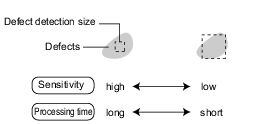Defects/Contamination Detection Measurement
Color changes within the measurement region are used to find defects such as scratches, contamination, and chipping.
After measurement region is drawn, a rectangle (defect detection region) is automatically formed in this region.While moving the defect detection region around, calculate average density for each area to determine the difference between the original area and the surrounding area. This difference is called the defect level. Calculate the defect level for all defect detection areas. If the maximum value exceeds the judgement value, it is judged that there are defects in the measurement region.
Increasing "Defect size" allows for shortening of processing time, but this will reduce measurement accuracy.

